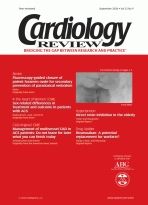Multivessel versus single-vessel PCI: A case-by-case decision
A 64-year-old white woman presented to a nearby emergency department after experiencing abrupt, intense chest pressure while playing tennis.
A 64-year-old white woman presented to a nearby emergency department after experiencing abrupt, intense chest pressure while playing tennis. The patient had a long-standing history of hypercholesterolemia and hypertension, but no previous angina or myocardial infarction. The initial electrocardiogram showed ST-segment depression of 0.2 mV in the inferior leads. Her first troponin-T test was negative. After initial medical stabilization, coronary angiography was undertaken. It showed a severe, proximal right coronary artery stenosis and 80% narrowing of the proximal left anterior descending artery. At this point, the interventional cardiologist faced a dilemma: would it be better if only revascularization of the culprit lesion was performed or would the patient benefit from more complete revascularization? The patient’s cardiologist opted to perform multivessel percutaneous coronary intervention (PCI), treating both the left anterior descending and right coronary artery proximal lesions. The outcome was favorable and the patient was discharged from the hospital the day after the procedure. Whether this approach will benefit her in the long-term is still unknown. At this stage, we need stronger evidence from prospective, randomized clinical trials to provide adequate guidelines for practitioners treating multivessel coronary artery disease patients who are PCI candidates.
